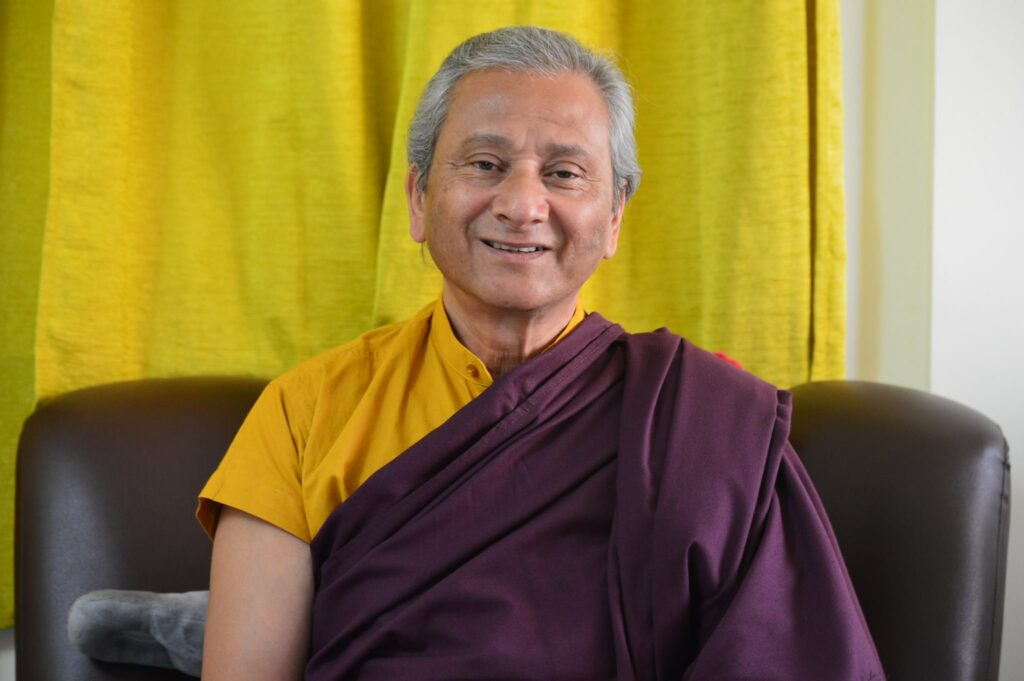Dr. Saamdu Chetri was born in rural Bhutan and has a PhD in commerce. After working in private and development sectors for 25 years, and Cabinet of the Prime Minister for five years, he then founded the Gross National Happiness Centre in Bhutan and headed it for five years. He has been teaching, consulting and speaking at various international and national occasions on mindfulness and Happiness, among others, in India, Czech, USA, Singapore, UK (also at the parliament), Hong Kong, Philippines, Switzerland, Denmark, Sweden, Germany, Mexico, Vietnam, Thailand, and travelled in several other countries. He is a strong supporter of equality and empowerment. He helped the national projects formulation in the country through Swiss support in training, infrastructure, services and other spiritual practices. He had interviews with BBC, ABC, ABS-CBN, CNN, and various other TVs including interviews in podcasts. There are two books to his credit, including, “Money and Microenterprises in Bhutan: The Land of Zorig Chug Sum,” “Thirteen Arts and Crafts,” and several contributions for many books.
MEASURE WHAT MATTERS
Studies show that our behavior is affected by our attention. The measures we choose – what draws our attention – will drive the things we do and the decisions we make. Measuring what matters helps us make decisions that are truly aligned with our values. When we measure what matters – things change!
Gross National Happiness (GNH) is a measure of economic happiness and moral progress that the king of the Himalayan country of Bhutan introduced in the 1970s as an alternative to Gross Domestic Product (GDP). Rather than focusing strictly on quantitative economic measures, Gross National Happiness takes into account an evolving mix of quality-of-life factors.
The kingdom of Bhutan’s first legal code, written at the time of unification in 1729, stated that “if the government cannot create happiness for its people, there is no purpose for the government.”
King Jigme Singye Wangchuck told the Financial Times in a 1972 interview that “Gross National Happiness is more important than Gross National Product.”
In 1998, the government of Bhutan established the Center for Bhutan Studies and Gross National Happines (CBSGNH) to conduct research on the topic. The institute’s mandate was to develop a GNH index and indicators that the government could build into its public policy decisions. Bhutan could then share this framework with the outside world, with which the isolated Himalayan country was increasingly in contact.
To that end, the GNH Center in Bumthang developed what it calls the four pillars of GNH: these are (1.) good governance, (2.) sustainable socio-economic development, (3.) preservation and promotion of culture, and (4.) environmental conservation. The 2008 constitution dictates that lawmakers must take each into account when considering new legislation.
THE NINE DOMAINS OF GROSS NATIONAL HAPPINESS
These pillars provide the foundation for happiness, which is manifest in the nine domains of GNH: (1.) living standards, (2.) education health, (3.) environment, (4.) community, (5.) vitality, (6.) time use, (7.) psychological well-being, (8.) good governance, and (9.) cultural resilience & promotion.
These 9 domains, clearly demonstrate that from the perspective of GNH, many inter-related factors are important in creating the conditions for happiness of a people.
For example, GNH counts the importance of material security as one of these – and assessing whether people enjoy sufficient and equitable living standards, is included in the GNH survey. Similarly, the happiness of human beings is not seen as separate from the wellbeing of other life forms, and ecological diversity and resilience are included in the measure of GNH. The balance between material and non-material development, and the multi-dimensional and interdependent nature of GNH are key features that distinguish GNH from GDP as a measure of a country’s progress.
In accordance with these 9 domains, Bhutan has developed 38 sub-indexes, 72 indicators and 151 variables that are used to define and analize the happiness of the Bhutanese people.
The CBSGNH published an official report of its research into GNH in 2012.
The research allows for so many components and domains of happiness because it operates on the assumption that happiness is a multidimensional concern. True contentment follows from the sense that others are happy, not just the self. In Bhutan, the pursuit of happiness is a collective one, though a significant portion of the sentiment comes from within. The nine-domain structure of GNH attempts to capture that multidimensional pursuit.
”Happiness is within. We experience the truth of this when we are totally no longer attached to greed, aversion or delusion. We experience happiness in relation to the self with self, self with others and self with nature. These are the three divides that make us suffer on this planet. We bring suffering to the Mother Earth because of these divides. Today, we are walking with our open eyes to the cliff. We need to bring transformation within each one of us.
We must connect with ourselves. We live in the past and future and not in the present moment. We connect ourselves through spirituality, becoming more and more compassionate and serving others. We must connect with other human beings.
OFFERINGS
Highly Effective Leader of Mindfulness: HELM has 35 hours of teaching for leaders. It has four divisions:
- GNH and its understanding
- Effective Leadership Habits
- Work psychology
- Mindfulness practice
